
The double bass, also known simply as the bass, amongst other names, is the largest and lowest-pitched string instrument in the modern symphony orchestra. Similar in structure to the cello, it has four, although occasionally five, strings.

The oud is a short-neck lute-type, pear-shaped, fretless stringed instrument, usually with 11 strings grouped in six courses, but some models have five or seven courses, with 10 or 13 strings respectively.
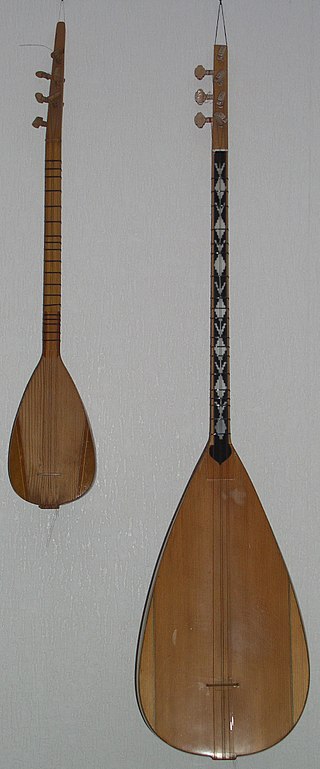
The bağlama or saz is a family of plucked string instruments, long-necked lutes used in Ottoman classical music, Turkish folk music, Turkish Arabesque music, Azerbaijani music, Balkan music, Kurdish music, Armenian music. It is played in several regions in the world such as Europe, Balkans, Black Sea, Caucasus regions and many countries including Syria, Iraq, Iran and the Balkan countries.

The rich and varied music of Sudan has traditional, rural, northeastern African roots and also shows Arabic, Western or other African influences, especially on the popular urban music from the early 20th century onwards. Since the establishment of big cities like Khartoum as melting pots for people of diverse backgrounds, their cultural heritage and tastes have shaped numerous forms of modern popular music. In the globalized world of today, the creation and consumption of music through satellite TV or on the Internet is a driving force for cultural change in Sudan, popular with local audiences as well as with Sudanese living abroad.
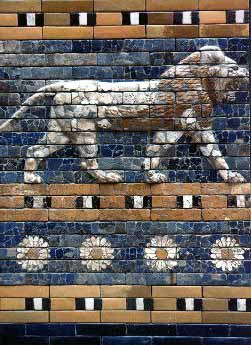
The music of Iraq or Iraqi music,, also known as the music of Mesopotamia, encompasses the music of a number of ethnic groups and musical genres. Ethnically, it includes Mesopotamian Arabic, Assyrian, Kurdish and the music of Turkmen, among others. Apart from the traditional music of these peoples, Iraqi music includes contemporary music styles such as pop, rock, soul and urban contemporary.
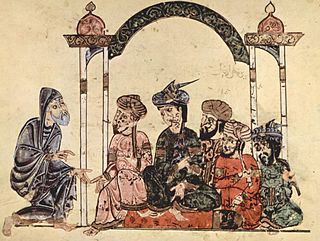
Arabic music or Arab music is the music of the Arab world with all its diverse music styles and genres. Arabic countries have many rich and varied styles of music and also many linguistic dialects, with each country and region having their own traditional music.
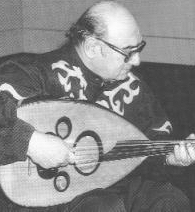
Munir Bashir, was an Iraqi Assyrian musician and one of the most famous musicians in the Middle East during the 20th century and was considered to be the supreme master of the Arab maqamat scale system.

Udi Hrant Kenkulian, often referred to as Udi Hrant or as Hrant Emre was an oud player of Turkish classical music, and a key transitional figure in its transformation into a contemporary style of popular music. He was an ethnic Armenian citizen of Turkey who spent most of his life in Turkey and wrote most of his lyrics in Turkish. He concurrently composed and performed in Armenian as well, although to a much lesser degree. Kenkulian recorded numerous sides in the United States and Europe during his travels in the mid-20th century.

Iraqi Maqam is a genre of Arabic maqam music found in Iraq. The roots of modern Iraqi maqam can be traced as far back as the Abbasid Caliphate, when that large empire was controlled from Baghdad. The ensemble of instruments used in this genre, called Al Chalghi al Baghdadi, includes a qari' (singer), santur, goblet drum, joza, cello, and sometimes oud and naqqarat. The focus is on the poem sung in classical Arabic or an Iraqi dialect. A complete maqam concert is known as fasl and is named after the first maqam: Bayat, Hijaz, Rast, Nawa, or Husayni.
The various nations of the region include the Arabic-speaking countries of the Middle East, the Iranian traditions of Persia, the Jewish music of Israel and the diaspora, Armenian music, Kurdish music, Azeri Music, the varied traditions of Cypriot music, the music of Turkey, traditional Assyrian music, Coptic ritual music in Egypt as well as other genres of Egyptian music in general, It is widely regarded that some Middle-Eastern musical styles have influenced Central Asia, as well as the Balkans and Spain

Rahim AlHaj is an Iraqi American oud musician and composer.
Şerif Muhiddin Targan, also known as Sherif Muhiddin Haydar or Serif Muhiddin Haydar, was a Turkish Arab classical musician and oud player. His instrumental compositions for the oud departed from the traditional style to explore the limits of this instrument, technically challenging the performer.
Jamil Bachir or Bashir was an Iraqi musician and expert oud player. The Iraqi Music Institute was opened in 1936, under administration of Hanna Petros (1896–1958), then in 1937 Sherif Muheddin Haydar and other professors joined the faculty of the Institute; Jamil Bashir was enrolled to learn oud with Sherif Muheddin Haydar and violin with Sando Albu. He finished his oud studies in 1943 and his violin study in 1946, and then worked at the Institute as an oud and violin teacher. He also wrote a two-volume oud method. Jamil Bashir was also a good singer, but he did not continue singing as he preferred the oud. He died in London on 24 September 1977.
Khaliji music is the music of Eastern Arabia, the Gulf Arabian states and it is popular across the Arab world. It is traditionally characterized by heavy use of the rebab, oud and other string instruments such as the violin, the occasional use of habbān, and the inclusion of percussion instruments such as the mirwas, tabl, and duff drums. Khaliji music first started as a bedouin tradition with poetry sung by a tribe's shaa'ir, which means poet, usually accompanied by a rebab, the lyrics dealt with tales of honor, love, camel riders, and glory warriors.

Omar Bashir is an Iraqi-Hungarian musician. His father, Munir Bashir, was considered to be the supreme master of the Arab maqamat scale system.
The Baghdad Conservatory is a music conservatory in Baghdad, Iraq. Hanna Petros founded the institution in 1936.
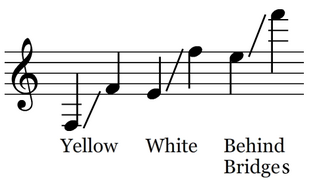
The santur, is a hammered dulcimer of Iranian origins.

Iraqi art is one of the richest art heritages in world and refers to all works of visual art originating from the geographical region of what is present day Iraq since ancient Mesopotamian periods. For centuries, the capital, Baghdad was the Medieval centre of the literary and artistic Arab world during the Abbasid Caliphate, in which Baghdad was the capital, but its artistic traditions suffered at the hands of the Mongol invaders in the 13th century. During other periods it has flourished, such as during the reign of Pir Budaq, or under Ottoman rule in the 16th century when Baghdad was known for its Ottoman miniature painting. In the 20th century, an art revival, which combined both tradition and modern techniques, produced many notable poets, painters and sculptors who contributed to the inventory of public artworks, especially in Baghdad. These artists are highly regarded in the Middle East, and some have earned international recognition. The Iraqi modern art movement had a profound influence on pan-Arab art generally.
Kadhim Haydar (1932–1985) was a highly respected Iraqi artist, poet, author, stage-set designer and educator who, as part of the first generation of modern Iraqi artists, had a major influence on the direction of modern Iraqi art. His artworks are noted for their use of symbolism, myth and poetic allegory within a contemporary framework.
Rohi al-Khammash (1923-1998) was an Iraqi musician and composer of Palestinian origin who played a major role in the development and preservation of Iraqi music and the flourishing of the musical movement in Iraq. He founded artistic groups that greatly contributed to the preservation and development of Iraqi artistic heritage, such as the Muwashahat Group in 1948, whose name was changed to “the Sons of the Tigris Group” in 1961, the Iraqi Chanting Group, and the Baghdad Quintet, which later became known as the Quintet of Fine Arts, among other groups that left a distinct mark on art, singing, and Iraqi music during the second half of the twentieth century. He composed the anthem "O God of the Universe," which is a religious supplication associated with the traditions and rituals of Ramadan in Iraq.












